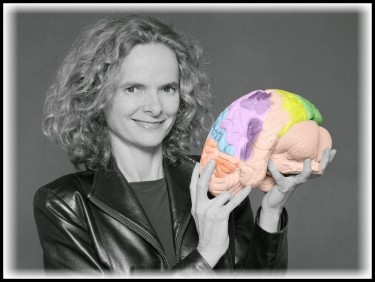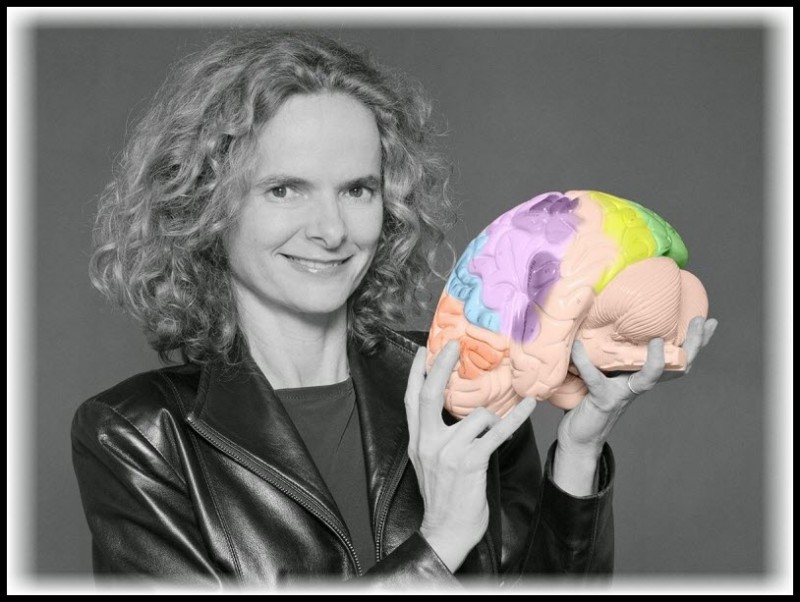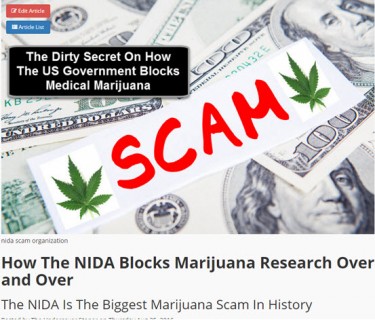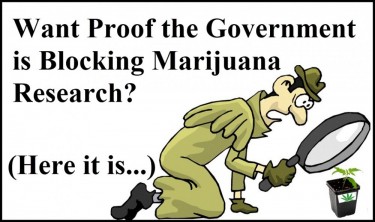A Look Inside the Mind of Volkov – Head of NIDA

You may not have heard the name Nora Volkow, she’s the head of NIDA – the National Institute on Drug Abuse. This is the very agency that funds all those studies on the dangers of cannabis and other drugs and have been used as an arm of the government to justify the prohibition of cannabis.
I have frequently analyzed their studies and poked holes in their methods over the years and in my mind – Volkow was some crazed drug warrior trying to maintain the status quo.
The problem with this assessment was that it wasn’t based on any facts whatsoever. I simply projected what I thought she was like and never took the time to actually investigates her ideas around drug use.
Recently, she was appeared on Drug Policy Alliance founder Ethan Nadelmann’s show where she discussed various different drug policies, including the impact of legalization and youth consumption.
I must admit, after hearing her out I must say that I was forced to readjust my point of view about her. It made me see her in a completely different light.
Here’s some of the core points that made me think twice.
No Rise in Teen Marijuana Use
The first major revelation from Volkow was her ability to admit when she was wrong. Advocates have been saying that cannabis legalization does not increase teen consumption, and evidence have suggested that it may even deter youth consumption.
While there has been certain spikes within a few demographics, the overall use of youth consumption has remain steady. There is no significant evidence to suggest that legalization has any real impact on adolescent consumption – except for “risk perception”.
“expecting the use of marijuana among adolescents would go up” when states moved to legalize cannabis, but admitted that “overall, it hasn’t.” as reported in Marijuana Moment.
While I’m not a big fan of NIDA’s view on cannabis in general, it was refreshing to hear the head of the organization admit when the data instructs a different narrative.
Some States have benefitted by Marijuana Legalization
Another refreshing perspective from Volkow was the fact that she could see the benefits in some states post legalization. However, she did point out that in other states there have been problematic cannabis use however does not ascribe this to the plant as opposed to the policies surrounding legalization.
“Understanding what policies basically protect from negative effects and may actually lead to better outcomes is crucial,” Volkow, who has been in office since 2003, said. “And we’re funding it.”
I think it is also important to define “negative effects” prior to creating blanket policies that might be difficult to change at a later stage. California is currently struggling to get their cannabis market functional and as of now has generated far more cannabis than consumers can handle.
This prompts illegal out-of-state commerce, the closing down of legacy farms and the burden is shifted on the consumer – paying exuberant fees for their cannabis.
The Criminalization of Drug Use
What surprised me from the interview was her views on the criminalization of drug use. One would think that an agency that has been historically against the use of drugs would not take issue with the current policies surrounding drug enforcement, however Volkow said that she had long been opposed to these ideas.
“hopefully science will serve to change policies and reduce the stigma [around addiction] and basically change the notion of criminalizing people to that of treating and helping people and preventing them from relapsing.”
In other words, Volkow believes that drug use and addiction should be a public health issue and not a law enforcement issue. This is something that cannabis activists have been saying for years – and the evidence is clear that when you confront drug addiction as a public health issue, you can make a difference.
Admitting that NIDA is a political tool
When the head of an agency tells you that their agency has been a political tool – then you know it’s true. Volkow didn’t textually say the word “tool”, but implied it with the following comment.
“operating (NIDA) in a political context in which punitive prohibitionist policies, mass arrests [and] the heavily racial biases that go with all of that has been pervasive.”
“From day one, I’ve been against criminalization of people because they have a problem with substance use disorders. I’ve been very, very vocal,” “One of the reasons why I took this position was because, I say, we can develop the science in such a way that policy changes.”
NIDA ultimately is under the authority of the federal government and while the people working there might have a different view on how to approach drug use and addiction – they are forced to play the political game.
In this case, creating studies to justify the prohibition of drugs.
She’s fighting the system in her way.
Volkow has been trying to change the system from within the system – however, it’s apparent that what they have been doing is not enough. More importantly, it’s an indication that “science” is not the dictating force within policy making.
“There are structural systems in such a way that promote certain behaviors, and science is not enough to change those policies.”
Anyone who has studied the war on drugs and drug prohibition knows that science has never been the core driver behind these policies.
She finds promise in Psychedelics
Finally, Volkow is opening up her views on other “Schedule I and Schedule II” drugs and how they may play an active role in helping people with psychological disorders.
We have been funding research that is ongoing—on ketamine for opiate treatment and also ketamine for pain,” she said. “For PCP, if you look at the data, actually, the evidence is strongest for showing potential benefits for depression.”
“We need to learn from what the evidence is showing us,” she continued. “If we can use ketamine for the treatment of severe depression in a way that is safe, this is an example of really that we can use drugs that we thought were dangerous and use them in ways that are therapeutic.”
The evidence is clear, drug criminalization simply doesn’t work – when we shift our priorities from trying to lock people up to trying to help those vulnerable to drug abuse and substance abuse – we begin to see real results.
Conclusion
I’m still not a fan of NIDA but then again, I can also understand that their primary function is to deal with drug abuse which is why they have been historically so negative about all the drugs. It’s their function.
There should be another agency that explores the benefits of these drugs in order to paint a wide enough picture to see how we can create policy that permits individual freedoms while protecting the most vulnerable among us.
My views on Volkow has changed. How about yours?
WHAT IS THE NIDA, READ MORE...
HOW THE NIDA BLOCKS MARIJUANA RESEARCH OVER AND OVER!








